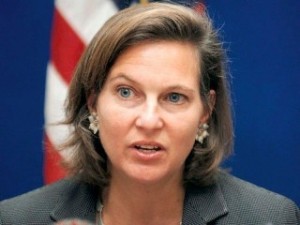This piece was reprinted by OpEd News with permission or license. It may not be reproduced in any form without permission or license from the source.
Reprinted from Consortium News
The year 2015 will surely mark a watershed in relations between the United States and Russia, one way or the other. However, whether tensions increase -- to war-by-proxy in Ukraine or an even wider war -- or whether they subside depends mostly on President Barack Obama.
Key to answering this question is a second one: Is Obama smart enough and strong enough to rein in Secretary of State John Kerry, the neocons and "liberal interventionists" running the State Department and to stand up to the chicken hawks in Congress, most of whom feel free to flirt with war because they know nothing of it.
Putin's elder brother Viktor died during the siege. The experience of Putin's youth is, of course, embedded in his consciousness. This may help to account for why he tends to be short on the kind of daredevil bluster regularly heard from senior Western officials these days -- many of whom are ignorant both of suffering from war and the complicated history of Ukraine.
This time last year, few Americans could point out Ukraine on a map. And malnourished as they are on "mainstream media," most have little idea of its internal political tensions, a schism between a western Ukraine oriented toward Europe and an eastern Ukraine with strong ties to Russia.
Let's start with a brief mention of the most salient points of this history before addressing its recent detritus -- and making a few recommendations as the New Year begins. Less than three weeks after the Berlin Wall fell on Nov. 9. 1989, President George H.W. Bush invited Kremlin leader Mikhail Gorbachev to a summit in Malta where they cut an historic deal: Moscow would refrain from using force to re-impose control over Eastern Europe; Washington would not "take advantage" of the upheaval and uncertainty there.
That deal was fleshed out just two months later, when Bush's Secretary of State James Baker persuaded Gorbachev to swallow the bitter pill of a reunited Germany in NATO in return for a promise that NATO would not "leapfrog" eastward over Germany. Former U.S. Ambassador to Moscow Jack Matlock, who was witness to all this, told me in an email, "I don't see how anybody could view the subsequent expansion of NATO as anything but 'taking advantage.'"
This consummate diplomat, who took part in the critical bilateral talks in early 1990, added that the mutual pledge was not set down in writing. Nonetheless, reneging on a promise -- written or not -- can put a significant dent in trust.
Why No Written Deal
Last year I asked Matlock and also Viktor Borisovich Kuvaldin, one of Gorbachev's advisers from 1989 to 1991, why the Baker-Gorbachev understanding was not committed to paper. Matlock replied:
"There was no agreement then. Both Baker and West German Foreign Minister Hans-Dietrich Genscher were putting forth ideas for Gorbachev to consider. He did not give an answer but just said he would think about them. ... The formal agreements had to involve others, and they did, in the two-plus-four agreement, which was concluded only in late 1990."
Fair enough.
In an email to me last fall, Kuvaldin corroborated what Matlock told me. But he led off by pointing out "the pledge of no eastward expansion of NATO was made to Gorbachev on consecutive days when he met first with Baker and then with West German Chancellor Helmut Kohl [on Feb. 9 and 10, 1990]." As to why this pledge was not written down, Kuvaldin explained:
"Such a request would have sounded a little bit strange at that time. The Warsaw Pact was alive; Soviet military personnel were stationed all over central Europe; and NATO had nowhere to go. At the beginning of February 1990, hardly anybody could foresee the turn of events in the 1990s."
Again, fair enough. But when I met Kuvaldin a few months earlier in Moscow and asked him out of the blue why there is no record of the promises given to his boss Gorbachev, his reply was more spontaneous -- and visceral. He tilted his head, looked me straight in the eye, and said, "We trusted you."
Written down or not, it was a matter of trust -- and of not "taking advantage." Kuvaldin's boss Gorbachev opted to trust not only the U.S. Secretary of State, but also the West German government in Bonn. According to a report in Der Spiegel quoting West German foreign ministry documents released just five years ago:
(Note: You can view every article as one long page if you sign up as an Advocate Member, or higher).






